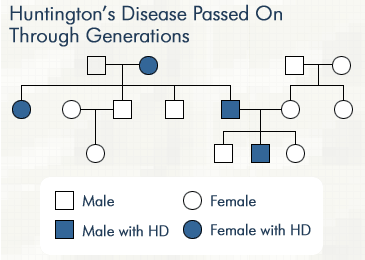
by Lakshmi Davey and Arvin Alaigh
Summary:
Huntington's Disease or Huntington's Chorea is a rare disease that results in the slow deterioration of the physical and mental abilities of the affected person. This autosomal dominant disease was named after George Summer Huntington, a researcher who wrote about the disease in a paper called "On Chorea" in 1872 ("Huntigton's Disease). Experts estimate that one in every 10,000 people (about 30,000 Americans) suffer from Huntington disease and another 150,000 are at risk for developing it. If a person with Huntington's Disease has a child, the child has a 50% chance of developing it. Since the disease does not manifest until a late age, an affected person will often have children already. You can take genetic tests to see if you are at risk for the disease.
 George Summer Huntington
George Summer Huntington
Symptoms:
- begin with noticable changes in behavior, including aggression, paranoia, and irritibility
- individuals may start to appear restless, with a constant tapping of the feet and odd twitches- this is called chorea.
- they begin to have impaired judgement and an inability to become organized
- as the disease worsens, the patient's IQ begins to decline, which coincides with the damage of the brain. The chorea worsens.
- in later stages, the disease may cause depression, anxiety, and apathy ("Huntington's Disease")
- illness typically takes 13-18 years (National Institute of Health)
- patients in later stages need full-time nursing care ("Huntington's Disease")
Treatment:
Although there is no known cure for Huntington's Disease, there is treatment. This treatment focuses on "reducing symptoms, preventing complications, and providing support and assistance to the patient and those close to him or her." (Neurology Channel)
Some medications to treat Huntington's disease are:
Antipsychotics - Antipsychotics help with preventing hallucinations, delusions, and violent outbursts with patients.
Antidepressants - Antidepressants help with preventing depression and obsessive-compulsive disorder (OCD) with patients.
Tranquilizers - Tranquilizers help if the patient is suffering from anxiety or chorea
Mood-stabilizers - Mood-stabilizers help the patient if they are suffering from mania or bi-polar disorder.
Botulinum toxin - Botulinum toxin helps the patient if they suffer from dystonia or jaw-clenching.
Patients with Huntington's Disease should try to get as much physical activity as their disease permits them to. "Daily exercise promotes physical and mental well-being." (Neurology Channel) Patients should try to walk as much as they can, even if assistance is needed. Small weights should be worn around the ankles to improve stability of the patient. They also need as much fluid as they can have to prevent dehydration. Also, "Unless and until the disease's progression prohibits it, people with HD should participate in outside activities, socialize, and pursue hobbies and interests." (Neurology Channel)
Genetic Information:
- HD is an autosomal dominant disease
- caused by a single defective gene on chromosome four (BBC health)
- the number of trinucleotide repeats tells you if you have the disease or not:
-
Normal alleles: 26 or fewer CAG repeats
-
Intermediate alleles: 27-35 CAG repeats. An individual with an allele in this range is not at risk of developing symptoms of HD, but may be at risk of having a child with an allele in the HD-causing range.
-
HD-causing alleles: 36 or more CAG repeats. This person would have the symptoms of HD. (Genetests).
Affected individuals are born with the defective gene (chromosome four), but they usually don't show signs of the disease until middle age.
 Example of a Huntington's Disease human pedigree
Example of a Huntington's Disease human pedigree
Support Groups:
1. International Huntington Association
Callunahof 8
Harfsen, Intl 7217 ST
Phone: 31-573-431595
E-mail: iha@huntington-assoc.com
Web site: http://www.huntington-disease.org
2.
Huntington's Disease Society of America
505 Eighth Ave, Suite 902
New York, N.Y. 10018
Telephone: (212) 242-1968
Toll Free: (800) 345-HDSA (4372)
E-mail: hdsainfo@hdsa.org
Web site: http://www.hdsa.org/
(NIH)
o Introduction of the disease
o Genetic information
o Symptoms
o Treatments and cures
o Appropriate images and pictures
o Contact information for support groups, etc.
In the ever increasing volume of information available on the World Wide Web, it is
important to consider the reliability of your sources. For this project, you may want
to avoid personal websites (although you may use them to obtain personal accounts
of those living with a particular disease).
What is the genetic cause of the disease?
What gene is mutated or chromosome altered?
What is the pattern of inheritance of the disease (dominant or recessive)?
What are the symptoms and characteristics of the disease?
What are the current methods of treatment/cure for the disease?
Works Cited
Human Genetic Disease Project
We have neither given nor recieved any unauthorized aid on this wiki.
Lakshmi Davey
Arvin Alaigh
Comments (0)
You don't have permission to comment on this page.